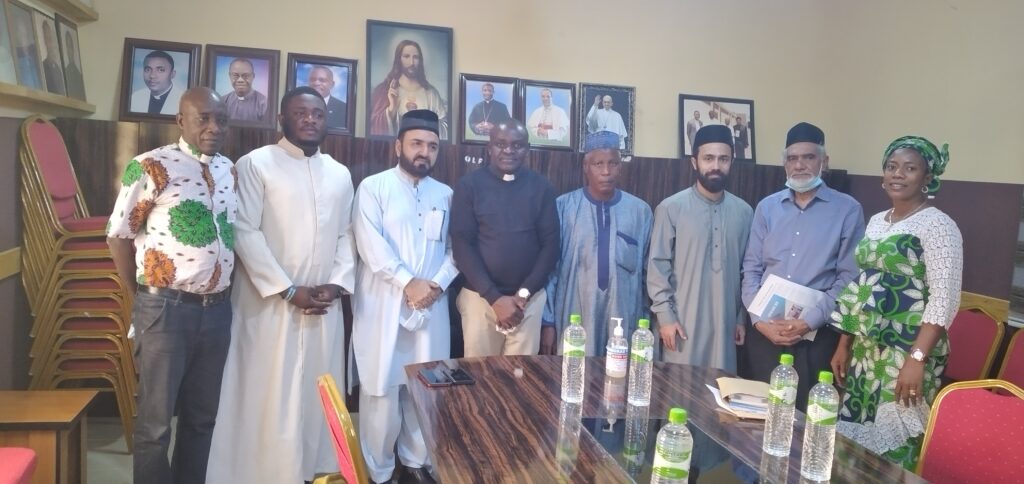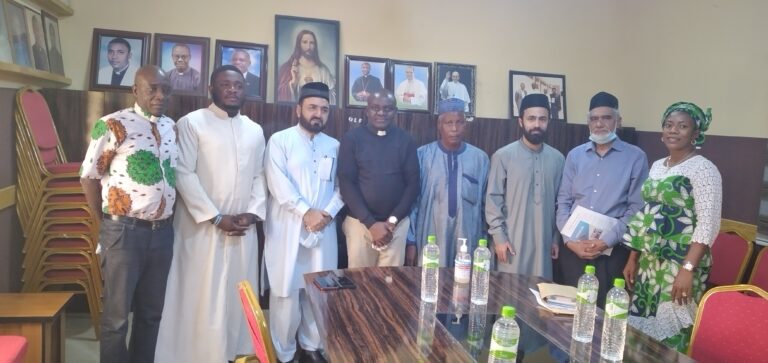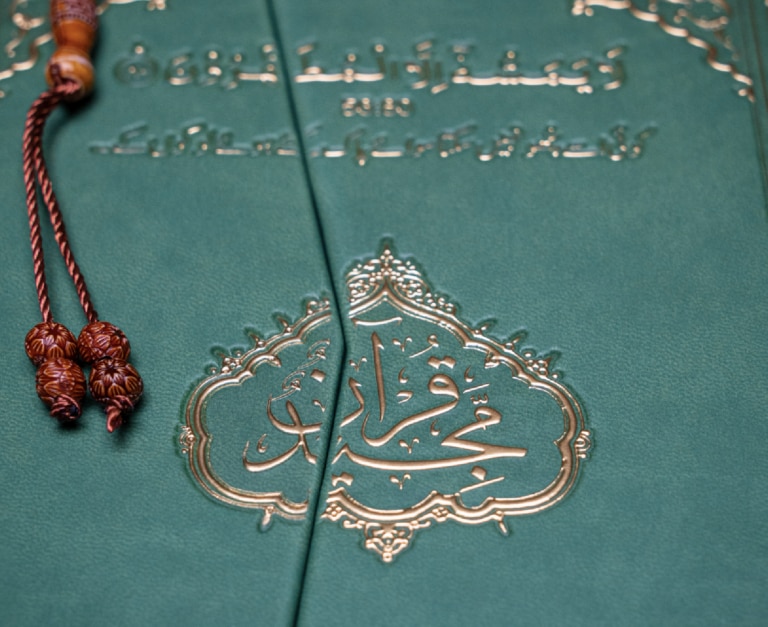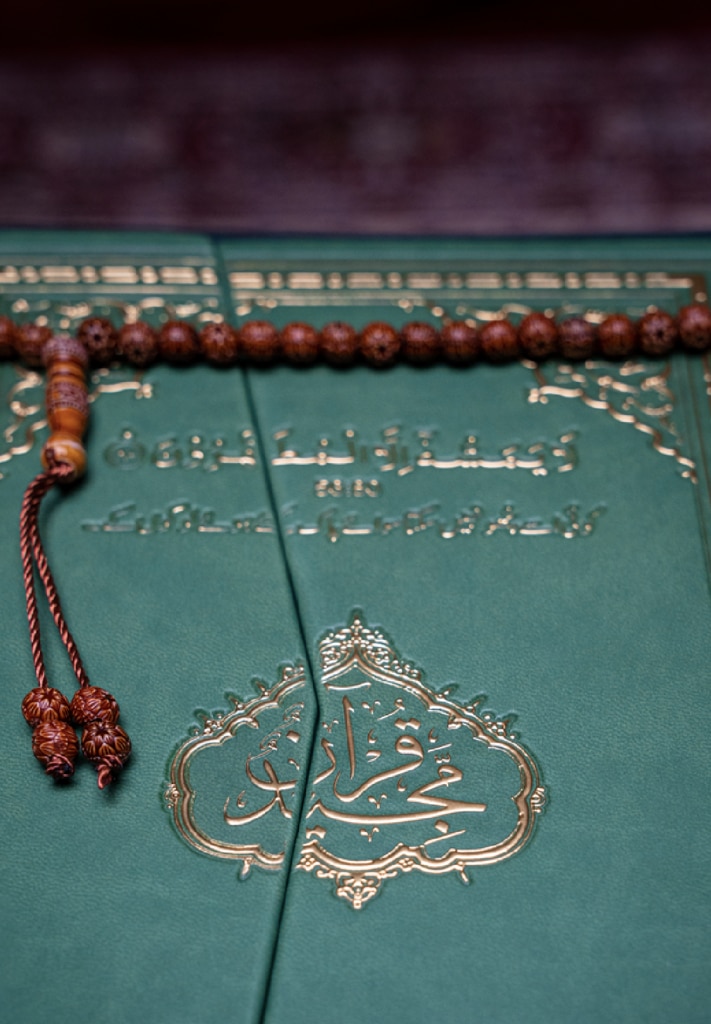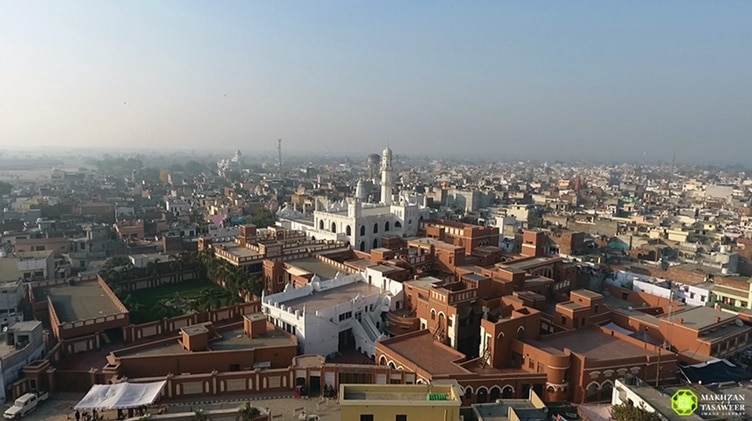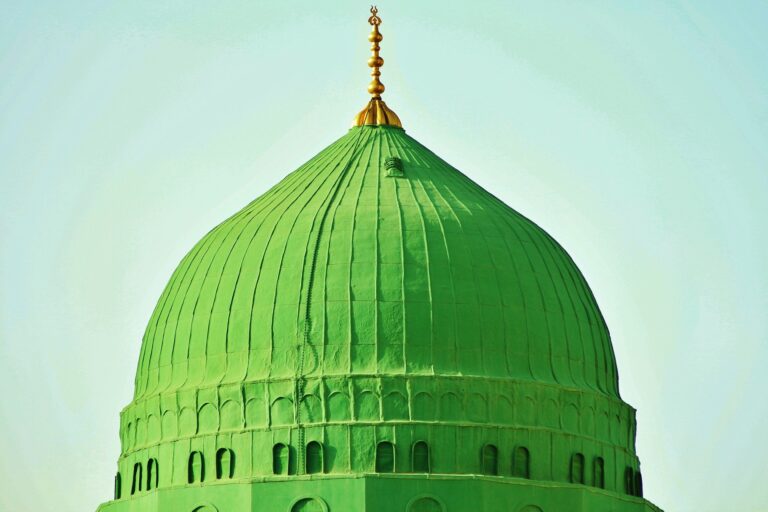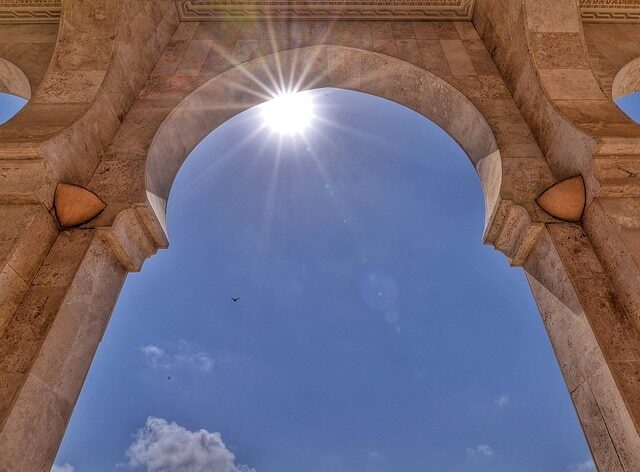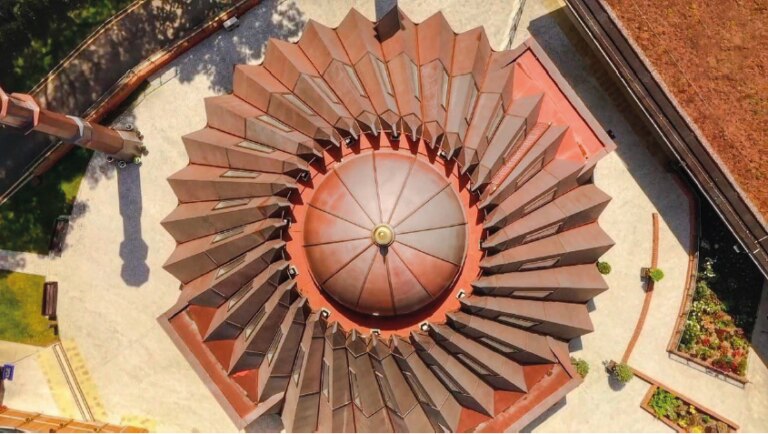Friday Sermon
30 October 2020
Men of Excellence: Hazrat Muazra bin Jabal and Hazrat Abdullahra bin Amr
After reciting the Tashahud, Ta‘awuz, and Surah al-Fatihah, Hazrat Khalifatul Masih Vaa said:
I was narrating the accounts from the life of Hazrat Muazra bin Jabal in the previous sermon and I will continue to do so today as well.
Hazrat Muazra was extremely charitable and used to generously spend on others. Owing to this he often had to take loans as well. When the people who had loaned him money pressured him to return the money, he hid in his home for a few days. Upon this, these individuals went to the Holy Prophetsa and requested him to ask Hazrat Muazra to pay back the loan. The Holy Prophetsa sent an individual to Hazrat Muazra and called for him. When the debt of Hazrat Muazra surpassed the value of his belongings, the Holy Prophetsa said that God would have mercy on the person who did not seek the repayment of the loan. Accordingly, some of them forgave his debt. However, some individuals still demanded for it to be paid back. Upon this, the Holy Prophetsa distributed his entire belongings among those individuals, but still there was some debt outstanding. The manner in which this debt was repaid was that each lender received a small portion of their money, but they demanded for the remaining amount to be paid back as well. Upon this, the Holy Prophetsa said to leave the matter for the time being as there was nothing more to give, therefore they ought to take that amount.
When Hazrat Muazra was left with nothing, the Holy Prophetsa sent him to Yemen and said that Allah will soon compensate his loss and enable him to pay off his debt. (Sheikh Shah Moinuddin Ahmad Nadvi, Siyar al-Sahabah, Vol. 3, Muazra bin Jabal [Karachi, Pakistan: Dar al-Isha‘ah, 2004], 502) (Ali Ibn al-Athir, Usd al-Ghabah fi Ma‘rifat al-Sahabah, Vol. 5, Muazra bin Jabal [Beirut, Lebanon: Dar al-Kutub al-Ilmiyyah, 2003], 188) (Ibn Saad, Al-Tabaqat al-Kubra, Vol. 3, Muazra bin Jabal… [Beirut, Lebanon: Dar al-Kutub al-Ilmiyyah, 1990], 441)
On this occasion, the Holy Prophetsa also said to Hazrat Muazra, “O Muaz! You have a lot of debt. Therefore, if you are presented with a gift, you may accept it. I permit you to do so.” (Siyar al-Sahabah, Vol. 5, p. 146, Dar al-Isha‘ah, Lahore)
The Holy Prophetsa said that he was permitted to accept gifts – under normal circumstances, there is nothing wrong in accepting gifts and it is said that giving each other gifts increases the love between people, and so one ought to give gifts. However, since Hazrat Muazra was sent as a representative of the Holy Prophetsa, he specifically instructed him that if he was presented with any gifts in his capacity as a representative, then he was permitted to spend it on himself. The reason for this [special permission] was that these gifts were generally given for the treasury [Bait al-Maal], or for the Holy Prophetsa.
Hazrat Muazra bin Jabal relates that when the Holy Prophetsa sent him to Yemen, the Holy Prophetsa walked outside with him in order to impart some advice. Hazrat Muazra was seated on his mount and the Holy Prophetsa walked alongside him. When the Holy Prophetsa completed what he had to say, he added, “O Muaz! It is possible that we may not meet in the coming year and it is also possible that you pass by my mosque and my grave.” Hearing this, Hazrat Muazra started to weep profusely because he was parting from the Holy Prophetsa. Following this, the Holy Prophetsa turned his blessed face towards Medina and said, “The righteous from among my people are near and dear to me, whoever they may be and wherever they may be.” (Musnad Ahmad bin Hanbal, Musnad Muazra bin Jabal, Vol. 7, p. 359, Hadith 22402, Alam ul-Kutub, Beirut, 1998)
It is stated in one narration that on this occasion, the Holy Prophetsa said to Hazrat Muazra, “Soon you shall go to those who are Ahl-e-Kitab [people of the book]. When you reach them, invite them to bear witness that there in none worthy of worship except Allah and that Muhammad is the Messenger of Allah. If they accept this, then inform them that Allah has prescribed for them the five daily prayers. If they accept this, then inform them that Allah has prescribed for them the giving of alms, which should be taken from their wealthy and given to their poor. If they accept this as well, then beware; do not take alms from their most valuable possessions, rather adopt the middle course with regard to taking from their wealth. And beware of the curse of the oppressed, for there is no barrier between them and Allah.” (Sahih al-Bukhari, Kitab al-Maghazi, Bab Ba‘th Abi Musa wa Muazra ila Yaman…, Hadith 347)
The Holy Prophetsa specifically advised him to be cautious lest he became the object of the prayers of those who are oppressed as there is no barrier between their pleas and Allah.
The Holy Prophetsa sent Hazrat Muazra bin Jabal to Yemen as a qazi. Hazrat Muazra would teach [the people of Yemen] the Holy Quran and matters of faith and would also settle their disputes. Those who collected Zakat in Yemen would send whatever they had collected to Hazrat Muazra bin Jabal. The Holy Prophetsa had entrusted five companions to oversee matters in Yemen; Hazrat Khalidra bin Saeed, Hazrat Muhajirra bin Umayyah, Hazrat Zaidra bin Labid, Hazrat Muazra bin Jabal and Hazrat Abu Musa Ash‘arira. (Ibn Abd al-Barr, Al-Isti‘ab fi Ma‘rifat al-Ashab, Vol. 3, Muazra bin Jabal [Beirut, Lebanon: Dar al-Jil, 1992], 460)
According to this narration, the administering of matters in Yemen was entrusted to these five companions.
Hazrat Muazra bin Jabal relates that when the Holy Prophetsa sent him to Yemen, he instructed, ‘For every 30 cows, take a one-year-old calf as Zakat and for every 40 cows, take a two-year-old cow (the Holy Prophetsa was stipulating the prescribed rate of Zakat and the threshold on which Zakatbecomes obligatory) and from every person who has reached the age of maturity, take one dinar or the equivalent in m‘afirah,’ which was the name of a Yemeni cloth. In fact, m‘afirah was the name of a tribe which made this cloth and thus the cloth was named after them. This narration is from Musnad Ahmad bin Hanbal. (Musnad Ahmad bin Hanbal, Musnad Muazra bin Jabal, Vol. 7, p. 348, Hadith 22363, Alam ul-Kutub, Beirut, 1998) (Lughaat-ul-Hadith, Vol. 3, p. 142, Pir Muhammad Kutub Khana Aram Bagh, Karachi)
Allamah ibn Saad states that Hazrat Muazra bin Jabal had a slight limp. When he went to Yemen, he led the people in prayer and whilst doing so, he extended his leg – meaning he must have placed it before him or extended it to the right or to whichever side his foot was impaired – and [those following him in prayer] also extended their legs in the same manner. When he had finished leading the prayer, Hazrat Muazra said, “You have done well to follow exactly as I have done; however, you must abstain from doing so in the future. I am compelled to extend my leg owing to my condition.” (Ibn Saad, Al-Tabaqat al-Kubra, Vol. 3, Muazra bin Jabal… [Beirut, Lebanon: Dar al-Kutub al-Ilmiyyah, 1990], 439)
What he meant was that the obedience which they had shown by doing exactly what he did was indeed praiseworthy. This in fact was true obedience, as whatever the imam does should be followed precisely. However, he was compelled to act in this way [i.e. to extend his leg] and this was not the practice of the Holy Prophetsa. Whoever is not compelled [by an ailment or injury] should offer their prayers according to the commandments, teachings and practice adopted by the Holy Prophetsa.
Hazrat Muazra conducted business in Yemen using money from the bait-ul-mal [treasury] and repaid his debts with the profits he made. He was the first person to conduct business with the wealth given in the way of Allah Almighty and this was done with the permission from the Holy Prophetsa. He also accepted gifts as a result of which he eventually had 30 livestock animals. (Sheikh Shah Moinuddin Ahmad Nadvi, Siyar al-Sahabah, Vol. 3, Muazra bin Jabal [Karachi, Pakistan: Dar al-Isha‘ah, 2004], 505) (Ibn Abd al-Barr, Al-Isti‘ab fi Ma‘rifat al-Ashab, Vol. 3, Muazra bin Jabal [Beirut, Lebanon: Dar al-Jil, 1992], 1404)
Thus, he used this wealth according to the permission granted by the Holy Prophetsa, which most certainly was for the purpose of repaying his debts. He conducted business only to the extent of using the profits to repay his debts. Or if he did not use the profits for this purpose, it is also possible he would retain it as remuneration for his work [for the bait-ul-mal]. The Holy Prophetsa had given him permission for this, which is why he took it and used it to repay his debts. This fact seems the most accurate in that he would take a certain amount from the profits made as remuneration. Nevertheless, his actions were in line with the permission granted by the Holy Prophetsa.
After the demise of the Holy Prophetsa, when Hazrat Muazra went to perform Hajj, he met Hazrat Umarra, who had been appointed by Hazrat Abu Bakrra to oversee matters pertaining to the Hajj. Hazrat Umarra and Hazrat Muazra met on the day of tarwiyyah. They embraced each other and expressed their condolences to one another for the demise of the Holy Prophetsa. Then they both sat on the ground and began conversing. (Ibn Saad, Al-Tabaqat al-Kubra, Vol. 3, Muazra bin Jabal… [Beirut, Lebanon: Dar al-Kutub al-Ilmiyyah, 1990], 441)
It is written in Al Isti‘ab, a book of history, that Hazrat Muazra was very generous and it was due to this generosity and benevolence that he fell into debt. He went to the Holy Prophetsa and requested him to ask those whom he owed to forgive his debt. This is the same incident mentioned earlier but from another source. The Holy Prophetsa made this request to those who he owed money to, but they refused to forgive the debt. Had they agreed to forgive the debts of Hazrat Muazra bin Jabal for anyone’s sake, it would have been for the sake of the Holy Prophetsa, as his rank and status was the greatest. Thus, it could only have been for his sake that one would forgive the debts owed to them or would present financial sacrifices. However, as mentioned earlier, some people refused and said, “O Messengersa of Allah, we will take the debt owed to us.” Then, in order to repay these debts, the Holy Prophetsa sold off the properties of Hazrat Muazra bin Jabal and he was left with no wealth or possessions.
In the same year as the Conquest of Mecca, the Holy Prophetsa sent Hazrat Muazra as a governor [amir] in one part of Yemen. Here it becomes clear that he was sent in the capacity of a governor; thus, any gifts he received in this capacity would have been considered as part of the treasury. He was the first person to conduct business from the treasury using the wealth given in the way of Allah. He remained in Yemen until the Holy Prophet’ssa demise, by which time he had become affluent. During this period, his business became profitable and whatever portion he would take led him to become well-off.
Later, when he returned [to Medina], Hazrat Umarra said to Hazrat Abu Bakrra, “He (i.e. Hazrat Muazra) should be summoned and aside from the necessities he requires, the rest of his wealth should be taken off him. The Holy Prophetsa only granted him permission for the sake of repaying his debts and now his debts have been repaid. He should keep the basic necessities he requires; however, he should not have accumulated wealth.”
This was the viewpoint of Hazrat Umarra that he ought to keep what is required and return the rest of the wealth. The matter was then presented before Hazrat Abu Bakrra. The degree of love which Hazrat Abu Bakrra had for the Holy Prophetsa did not allow him to bear that he should make a decision contrary to something for which the Holy Prophetsa had granted permission. Thus, Hazrat Abu Bakrra said, “The Holy Prophetsa sent him and I shall not take anything back from him”; he sent him off, saying that he had permission to conduct business and use the profit from it, “unless he wishes to return it to me himself, as I will not take anything from him. He went upon the instructions of the Holy Prophetsa and accepted gifts and other things with his permission. Unless he offers it to me himself, I shall not ask him to.”
Hazrat Umarra then went to Hazrat Muazra. Hazrat Umarra was very resolute when it came to certain matters of principle, so he went to Hazrat Muazra and mentioned this all to him. Hazrat Muazra replied, “The Holy Prophetsa sent me so that I may fulfil my requirements, so I shall not give anything of it.” It is also established through the various accounts and the biographies of his life that if Hazrat Muazra ever did pass through times of prosperity, they would only last for a few days, as he would regularly distribute his wealth among the people. We shall see in the accounts later on just how he would distribute it.
Hazrat Muazra thereafter went to Hazrat Umarra and said, “I accept what you said.” Previously, he said to Hazrat Umarra that he would not give anything, but after some time, he went to Hazrat Umarra and said he accepted and consented to what he had asked and would act according to what he said. This must have been after some time because there is a mention of a dream.
Hazrat Muazra stated, “I saw in the dream that I am drowning in water and you [i.e. Hazrat Umarra] rescued me.” Hazrat Muazra then went to Hazrat Abu Bakrra, related everything to him and vowed, “I shall not hide a single thing from you.” Meaning from where and how he received the money. Hazrat Abu Bakrra said, “I shall not take a thing from you. Yes, you have related all of this to me and accounted for everything, but I shall take nothing from you and I have given it all to you as a gift.” Hazrat Umarra, who was also present, said, “This is the best solution.” (Ibn Abd al-Barr, Al-Isti‘ab fi Ma‘rifat al-Ashab, Vol. 3, Bab Harf al-Meem, Muazra bin Jabal [Beirut, Lebanon: Dar al-Jil, 1992], 461)
When he came to know of this that now the Khalifa of the time had made a decision even after Hazrat Muazra had offered all the money, Hazrat Umarra accepted the decision with complete obedience. It did not matter to him as to why it was being taken; all that mattered was that after the demise of the Holy Prophetsa, the decision should rest with the Khalifa of the time as to whether or not he could keep the wealth and spend out of it.
Prior to this, Hazrat Umarra was insisting that the wealth should be taken from Hazrat Muazra, but when Hazrat Abu Bakrra made his decision that he would not take it from him and that he would give it all back to him as a gift, Hazrat Umarra did not insist on the matter and stated, “Indeed, this is the best solution in relation to this matter.”
Here, there is further clarification that God Almighty did not draw Hazrat Muaz’sra attention to this matter until his needs had been fulfilled. Furthermore, after the demise of the Holy Prophetsa and when Hazrat Muaz’sra needs were also fulfilled, he was granted prosperity and his debts were paid off, only then did God Almighty draw Hazrat Muaz’s attention to this matter through a dream in which he was told that he should now suffice on his own property. In other words, he should no longer accept gifts in the capacity of being the governor, nor spend out of the treasury. He did not remain there for long after this, but in any case, this was a brief explanation.
Hazrat Muazra relates that when the Holy Prophetsa sent him towards Yemen, he asked, “How will you deal with a matter when it is brought before you?” He answered, “I shall decide in accordance with the Book of Allah.” The Holy Prophetsa then asked, “And if you do not find the command in the Book of Allah?” to which Hazrat Muazra replied, “I shall decide in accordance with the practice [sunnah] of Allah’s Messengersa.” The Holy Prophetsa then asked, “And if you do not find the instruction in the sunnah of the Messenger of Allah?” Hazrat Muazra answered, “I shall form my opinion according to my reasoning and shall not show any carelessness in this regard.” Hazrat Muazra states that when the Holy Prophetsa had listened to these three things, he placed his hand upon his chest and said, “All praise belongs to Allah, Who has enabled the ambassador of the Messengersa of Allah to become a source of joy for him.” (Musnad Ahmad bin Hanbal, Musnad Muazra bin Jabal, Vol. 7, p. 347, Hadith 22357, Alam ul-Kutub, Beirut, 1998)
Hazrat Muazra narrates that when the Holy Prophetsa sent him to Yemen he instructed him not to adopt a life of comfort and ease, because the servants of Allah do not live a life of worldly comforts. (Musnad Ahmad bin Hanbal, Musnad Muazra bin Jabal, Vol. 7, p. 375, Hadith 22456, Alam ul-Kutub, Beirut, 1998)
This further clarifies that the Holy Prophetsa was aware that Hazrat Muazra was very generous and that he would spend the wealth from gifts and trade to help those in need. Even so, after giving permission for this, the Holy Prophetsa advised him not to live a life of comfort; instead, it was merely to fulfil his [basic] needs. So he admonished him to refrain from this.
Hazrat Muazra relates, “When I placed my foot in the stirrup as I was about to depart to Yemen, the Holy Prophetsa gave me a final piece of advice, saying, ‘Meet people in a courteous manner, meet the people in a courteous manner.’” (Ibn Saad, Al-Tabaqat al-Kubra, Vol. 3, Muazra bin Jabal… [Beirut, Lebanon: Dar al-Kutub al-Ilmiyyah, 1990], 439)
However, look at the condition of the Muslims of today. Do they conduct themselves in this manner? And yet, they celebrate the milad-un-Nabi [birthday of the Holy Prophetsa]? The true essence of commemorating milad-un-Nabi is by following the example of the Holy Prophetsa and to act upon his teachings. When the Holy Prophetsa sent Hazrat Muazra as the governor of Yemen, he described his status in the following words:
اِنِّيْ بَعَثْتُ لَكُمْ خَيْرَ اَهْلِيْ
meaning, “Surely I send to you the best of my people.” (Sheikh Shah Moinuddin Ahmad Nadvi, Siyar al-Sahabah, Vol. 3, Muazra bin Jabal [Karachi, Pakistan: Dar al-Isha‘ah, 2004], 502)
Ibn Abi Naji‘ narrates that the Holy Prophetsa appointed Hazrat Muazra as the governor of Yemen, stating to the people of Yemen, “Indeed I have sent to you a governor who is the most knowledgeable of my people and the most well-versed in the matters of faith.” (Ibn Sa’d, Al-Tabaqat al-Kubra, Vol. 3, Muazra bin Jabal… [Beirut, Lebanon: Dar al-Kutub al-Ilmiyyah, 1990], 438-439)
In a Hadith of Musnad Ahmad bin Hanbal, it is mentioned that Hazrat Muazra related, “The Holy Prophetsa gave me 10 instructions, saying, ‘The first is to not associate any partners with Allah, even if you are killed or thrown into the fire. Secondly, to not disobey one’s parents, even if they deprive you of your share in the inheritance.’” One should not disobey their parents, no matter what happens, even if one received nothing from them. “‘The third advice is to not miss any obligatory prayer knowingly, for one who abandons an obligatory prayer on purpose deprives himself from the support and protection of God Almighty.’ The Holy Prophetsa then said, ‘Never consume alcohol, for this is the root of every indecency.’ He then stated, ‘Abstain from sin and disobedience, because sin draws the displeasure of God Almighty.’ He then said, ‘When facing the enemy in battle, you must not flee. If you are confronted by the enemy, then you should not run away out of fear, even if the people are killed.’ He then stated, ‘If the people are afflicted with an epidemic such as the plague, they should remain wherever they are.’”
If they reside in an area where there is an outbreak of the plague, then the Holy Prophetsa has instructed that one should remain where they are.
“The Holy Prophetsa further stated, ‘Spend on your family according to your means, fulfil their rights and do not show any negligence in their moral training, (even if one has to show a little strictness in their moral training then one should do so to ensure for a good upbringing), instil the fear of God in them.’”
These were the ten things the Holy Prophetsa advised him about. (Musnad Ahmad bin Hanbal, Musnad Muazra bin Jabal, Vol. 7, p. 366, Hadith 22425, Alam ul-Kutub, Beirut, 1998)
Hazrat Ibn Umarra narrates that the Holy Prophetsa said to Hazrat Muazra, “I shall grant you advice like a kind-hearted brother. I advise you to instil the fear of Allah in yourself, visit the sick, fulfil the needs of the widows and the elderly, comfort those who are in need, dispense justice, speak the truth and never allow your fear of being rebuked stop you in matters relating to God. This is the advice I give to you.” (Kanz al-Ummal, Vol. 15, Hadith 43555, Kitab al-Mawa‘idh…, Chapter 10, Mu‘assisah al-Risalah, Beirut, 1985)
On one occasion, Hazrat Umarra asked his companions to express their desire for something. One of them replied, “I wish this house be filled with gold, so I may spend it in the way of Allah as sadaqah.” Another stated, “I wish this house be filled with pearls and rubies, so I may spend it in the way of Allah as sadaqah.” How lofty were the aspirations of the companionsra! Hazrat Umarra then asked them to further express what they desired. They submitted, “O Leader of the Faithful, we do not understand as to what it is that we should desire?” Hazrat Umarra stated, “I wish that this house be filled with people like Hazrat Abu Ubaidahra bin Jarah, Hazrat Muazra bin Jabal, Salimra, the freed slave of Abu Huzayfara and Hazrat Huzayfara bin Yaman.” (Al-Mustadrak Ala al-Sahihain, Vol. 3, p. 252, Hadith 5005, Kitab Marifat al-Sahabah, Dar al-Kutub al-Ilmiyyah, Beirut, 2002)
I have mentioned this narration previously as well and this time it has been narrated with reference to Hazrat Muazra bin Jabal.
Hazrat Muazra lived in Yemen for two years, from 9 AH to 11 AH. (Sheikh Shah Moinuddin Ahmad Nadvi, Siyar al-Sahabah, Vol. 3, Muazra bin Jabal [Karachi, Pakistan: Dar al-Isha‘ah, 2004], 505)
On one occasion, Hazrat Umarra bin Khattab placed 400 dinars in a money pouch and told one of his emissaries to take it to Hazrat Abu Ubaidahra bin Jarrah and remain there for a while and to take note of what he did with it. This account was mentioned in a previous sermon with reference to Hazrat Abu Ubaidahra bin Jarrah, but I did not mention the entire account; however, I shall narrate the full account now. And so, the emissary went to Hazrat Abu Ubaidahra bin Jarrahra with the small pouch of money and said, “The Leader of the Faithful has given this to you and said you may use it to fulfil any need you may have with it.” Hazrat Abu Ubaidahra replied, “May Allah bestow His mercy upon him.” He then called one of his maidservants and told her to give seven dinars to such and such person, five to such and such, five to such and such and in this way, he distributed the entire amount.” In other words, he called his maidservant and asked her to distribute all the wealth to the various houses, who perhaps were in need of it. The emissary returned to Hazrat Umarra and related the entire incident.
Hazrat Umarra had prepared another pouch for Hazrat Muazra which contained the same amount of money that was sent to Hazrat Abu Ubaidahra. Hazrat Umarra told the emissary to give the pouch to Hazrat Muazra and again instructed him to remain in his house for a while and observe what he did with it. And so, the emissary took the pouch and went to Hazrat Muazra and said, “The Leader of the Faithfulra has said that you may use this to fulfil whatever needs you may have.” Hazrat Muazra replied, “May Allah bestow His mercy upon him.” Hazrat Muazra then called his maidservant and told her to give a certain amount to such and such house and a certain amount to such and such house. Whilst Hazrat Muazra was distributing the wealth, his wife entered and said, “By God, we are also in need of it for there is nothing in the house. Please keep something for us as well.” (This narration further clarifies the earlier narration regarding making a profit and receiving gifts.) His wife stated that they had nothing at home and thus, they too were in need of it. By then, all the money had been distributed and only two dinars remained in the pouch which Hazrat Muazra bin Jabal handed over to his wife. The emissary returned to Hazrat Umarra and related the entire incident. Hazrat Umarra was extremely pleased by this and stated, “Indeed, Hazrat Ubaidahra and Hazrat Muazra are like two brothers.” (Majma al-Zawa‘id wa Manba al-Fawa‘id, Kitab al-Zakah, Bab fi al-Infaq, Dar al-Kutub al-Ilmiyyah, Beirut, 2001)
In other words, this attribute of spending [on others] was shared by both.
Is it narrated by Shuraih bin Ubaid, Rashid bin Saad, etc. that when Hazrat Umarra reached Saragh, which is the name of a settlement situated near the valley of Tabuk, he was informed that there was a very severe outbreak of a plague in Syria. Subsequently, Hazrat Umarra announced, “I have been informed that there is a very severe outbreak of the plague in Syria. Thus, if I am about to die and Abu Ubaidahra is alive then I shall appoint him as the Khalifa. And if Allah the Almighty asks me as to why I appointed him as the Khalifah of the Muslim Ummah, I will submit that I heard His Messengersa say that every prophet is granted a custodian [for his Ummah] and the custodian [of his Ummah] is Abu Ubaidah bin Jarrah.” This narration has been previously mentioned as well. However, people expressed their concern over this and enquired as to what would happen to the prominent members of the Quraish, i.e. the Banu Fehr. Hazrat Umarra then stated, “If my demise is imminent and Abu Ubaidah bin Jarrah has also passed away, then I shall appoint Muazra bin Jabal as the Khalifa. If my Lord, the Glorious and Exalted were to ask me as to why I appointed him, I will submit that I heard His messengersa say that on the Day of Judgment, Muazra bin Jabal will walk ahead of the scholars of faith.” (Musnad Ahmad bin Hanbal, Musnad al-Khulafa al-Rashidin, Musnad Umar al-Khattab, Vol. 1, p. 109, Hadith 108, Alam al-Kutub, Beirut, 1998) (Yaqut Ibn Abd Allah al-Hamawi, Mu‘jam al-Buldan, Vol. 3 [Beirut, Lebanon: Dar Ihya al-Turath al-Arabi], 239)
This was the lofty status Hazrat Muazra bin Jabal occupied in regard to his knowledge.
In the Battle of Yarmuk in 15 AH, Hazrat Abu Ubaidahra and Hazrat Muazra bin Jabal were appointed commanders on the right flank of the army. The Christians attacked with such intensity that the right flank of the army broke away from the rest of the army and consequently the soldiers became dispersed. Upon witnessing these circumstances, Hazrat Muazra bin Jabal displayed great courage and remained resolute. He stepped down from his horse and said that he would now fight on foot and if there was anyone who could do justice by fighting on a horse, then his horse was at their service. Hazrat Muazra bin Jabal’s son was also present in the battlefield and he said, “I shall do justice to it because I can fight better on horse”. And so, both father and son, penetrated into the Byzantine forces and fought so valiantly that the Muslims who had initially lost their footing were now able to regroup and thus by defeating the enemy, their state of fear was transformed into victory for the Muslims. (Sheikh Shah Moinuddin Ahmad Nadvi, Siyar al-Sahabah, Vol. 3, Muazra bin Jabal [Karachi, Pakistan: Dar al-Isha‘ah, 2004], 508) (Feroz al-Lughat, p. 1332, zir Lafz Maimanah)
Abu Idrees Khaulani narrates, “When I entered into the mosque in Damascus, Syria, I saw a young man with bright shining teeth and people were sat around him. Whenever people had a difference of opinion on a matter, they would present the matter to him and would give precedence to his opinion on the matter. When I enquired about him, I was informed that he was Hazrat Muazra bin Jabal.
“The next day in the afternoon, I went again and saw that he was already there before me and was offering his prayers. I waited and when he finished his prayer, I went before him and conveyed the greetings of peace. I then said, ‘I swear by Allah, I love you for His sake.’ Hazrat Muazra bin Jabal asked, ‘Do you swear by Allah?’ I replied, ‘Yes, I swear by Allah.’ Hazrat Muazra bin Jabal again asked, ‘Do you swear by Allah?’ I again replied, ‘Yes, I swear by Allah.’ Hazrat Muazra bin Jabal then took hold of the corner of my cloak and pulled me towards himself and said, ‘Rejoice, for I have heard the Messengersa of Allah say that Allah the Exalted has stated, “Those who show love to one another for My sake, those who sit with one another for My sake, those who meet one another for My sake and those who spend their wealth for one another for My sake, will most surely be granted My love.”’”
In other words, Allah the Almighty’s love will become incumbent for them. (Musnad Ahmad bin Hanbal, Musnad Muazra bin Jabal, Vol. 7, p. 353-354, Hadith 22380, Alam al-Kutub, Beirut, 1998)
In one of the narrations it states that Hazrat Muazra bin Jabal had two wives. When it would be the turn of one wife, he would not even take water to drink from the other wife’s house; such were his standards of justice. In another narration it states that Hazrat Muazra bin Jabal had two wives. When it would be the turn of one wife, he would not even perform the ablution in the house of the other. Both of his wives passed away in Syria owing to the plague and both were buried in one grave. Whilst they were being buried, Hazrat Muazra bin Jabal drew a lot to decide who would be lowered into the grave first. This was the level of justice he possessed. (Hilyat al-Auliya, Vol. 1, Ch. 1, p. 204; Translated by Muhammad Asghar Mughal, Dar al-Isha‘ah, Karachi, 2006)
In another narration in Siyar Al-Sahaba, it states that Hazrat Muazra bin Jabal had two wives who passed away due to the Plague of Amwas and it is also reported that one of his sons, Abdur Rahman, who took part in the Battle of Yarmuk alongside Hazrat Muazra bin Jabal also passed away due to the Plague of Amwas – this was a plague that spread during that time. (Sheikh Shah Moinuddin Ahmad Nadvi, Siyar al-Sahabah, Vol. 3, Muazra bin Jabal [Karachi, Pakistan: Dar al-Isha‘ah, 2004], 510-511)
When Hazrat Abu Ubaidahra passed away due to the Plague of Amwas, Hazrat Umarra appointed Hazrat Muazra bin Jabal as the governor of Syria. I previously mentioned the details in relation to Amwas which was the name of a settlement situated 7 miles from Ramla in the direction of Jerusalem. Hazrat Muazra also passed away due to the Plague of Amwas in the same year. (Ibn Abd al-Barr, Al-Isti‘ab fi Ma‘rifat al-Ashab, Vol. 3, Muazra bin Jabal [Beirut, Lebanon: Dar al-Jil, 1992], 1405) (Yaqut Ibn Abd Allah al-Hamawi, Mu‘jam al-Buldan, Vol. 4 [Beirut, Lebanon: Dar Ihya al-Turath al-Arabi], 177-178)
Kathir bin Murrah relates that during the period of his illness, Hazrat Muazra bin Jabal told them, “I have heard the Holy Prophetsa say something which till now I have kept hidden from you. I heard the Holy Prophetsa say that entrance into Paradise will become incumbent for one who states, ‘There is none worthy of worship except Allah.’” (Musnad Ahmad bin Hanbal, Musnad Muazra bin Jabal, Vol. 7, p. 355, Hadith 22383, Alam al-Kutub, Beirut, 1998)
In another narration it states that Hazrat Muazra stated, “The only reason why I did not inform you of this hadith was lest you solely relied on this and abandoned all other good deeds.” (Musnad Ahmad bin Hanbal, Musnad Muazra bin Jabal, Vol. 7, p. 361, Hadith 22410, Alam al-Kutub, Beirut, 1998)
When the plague spread in Syria, Hazrat Muazra bin Jabal also became ill due to the plague and owing to his illness was overcome with a state of unconsciousness. When he regained consciousness, he stated, “O Allah, cause this affliction [i.e. the plague] to take over me. I swear by Your honour that indeed You are aware that I love You.” Hazrat Muazra bin Jabal again fell unconscious and when he regained consciousness, he again offered the same prayer.
Nearer to the time of his demise, Hazrat Muazra bin Jabal asked if it was morning and was informed that the daybreak had not occurred yet. When dawn broke, Hazrat Muazra bin Jabal was subsequently informed and he said, “I seek refuge in Allah from the night whose morning takes one to the hell-fire. I welcome death and to meet my beloved who comes after a long time. O Allah, You indeed know that I fear You, but today I am in hope. I do not love the world and seek a long life so that I can dig streams and plant trees, rather so that I may endure the intense thirst of midday and the difficulties of my circumstances and sit in the company of those scholars who remain occupied in Your remembrance.”
In another narration it is mentioned that when Hazrat Muazra was close to his demise, he began to cry. Some people asked him why he was crying as he was a companion of the Holy Prophetsa. He replied, “I am not crying because I fear death, nor am I crying because I am departing this world. The reason why I am crying is that there are only two groups of people: those who are heaven-bound and those who are hell-bound, and I do not know from which of these two groups I will be raised up again after death. I only fear Allah the Almighty and that is why I am crying.” (Ali Ibn al-Athir, Usd al-Ghabah fi Ma‘rifat al-Sahabah, Vol. 5, Muazra bin Jabal [Beirut, Lebanon: Dar al-Kutub al-Ilmiyyah, 2003], 189)
In Musnad Ahmad bin Hanbal there is a narration of Hazrat Muazra in which he states, “I heard the Holy Prophetsa say, ‘Very soon you will migrate to Syria and it will be conquered at your hands. But then you will suffer from an outbreak of a disease which will consist of boils and blisters or cause a sharping pain. It will appear below the navel region and Allah will grant martyrdom to some people through this and will purify their deeds.’ O Allah! If it is true that indeed Muaz bin Jabal heard these words from the Holy Prophetsa, then grant me and my family a large share from it [i.e. from the prophecy about the plague].” Thus, they all [i.e. Hazrat Muazra and his household] suffered from this plague and not a single one of them survived.
When the boil of the plague became visible on Hazrat Muaz’sra index finger, he would say that this pleased him greatly and that even if he were given red camels, it would not please him more. (Musnad Ahmad bin Hanbal, Musnad Muazra bin Jabal, Vol. 7, p. 371, Hadith 22439, Alam al-Kutub, Beirut, 1998)
In Tabari it is stated that a boil developed in the palm of his hand. He would look at his boil and kiss the back of the same hand, saying, “There is nothing in this world that I would exchange for this.” (Muhammad Ibn Jarir al-Tabari, Tarikh al-Tabari, Vol. 4, Khuruj Umar bin al-Khattab ila al-Sham [Beirut, Lebanon: Dar al-Fikr, 1987], 238)
Hazrat Muazra bin Jabal passed away in 18 AH. There are varying opinions with regards to his age at the time of his demise. His age has been recorded as 33, 34 or 38 years old. (Ali Ibn al-Athir, Usd al-Ghabah fi Ma‘rifat al-Sahabah, Vol. 5, Muazra bin Jabal [Beirut, Lebanon: Dar al-Kutub al-Ilmiyyah, 2003], 190)
There a total of 157 narrations related by Hazrat Muazra. Two of these hadith are such that are found in both Bukhari and Muslim. (Sheikh Shah Moinuddin Ahmad Nadvi, Siyar al-Sahabah, Vol. 3, Muazra bin Jabal [Lahore, Pakistan: Idarah Islamiyyah], 156)
The next companion whose accounts I shall relate is Hazrat Abdullahra bin Amr. Hazrat Abdullahra belonged to the Banu Salamah clan of the Khazraj tribe of the Ansar. His father’s name was Amr bin Haram and his mother’s name was Rubab bint Qais. (Ibn Saad, Al-Tabaqat al-Kubra, Vol. 3, Abd-Allah bin Amr [Beirut, Lebanon: Dar al-Kutub al-Ilmiyyah, 2012], 423)
Hazrat Abdullahra bin Amr was born approximately 40 years before the migration. (Sahabah al-Kiram Encyclopaedia, Dr Dhulfiqar Kazim, p. 486, Abd-Allah bin Amr, Bait al-Ulum, Purani Anarkli, Lahore)
In other words, at the time of the migration to Medina, he was 40 years old. Hazrat Abdullah bin Amrra was the father of the renowned companion, Hazrat Jabirra bin Abdillah. (Ibn Hajar al-Asqalani, Al-Isabah fi Tamyiz al-Sahabah, Vol. 4, Abd-Allah bin Amr [Beirut, Lebanon: Dar al-Kutub al-Ilmiyyah, 2005], 162)
Hazrat Abdullahra bin Amr was the brother in law of Hazrat Amrra bin Jamuh. (Khutbat-e-Tahir, Taqarir Jalsa Salana Qabl az Khilafat, Taqrir Jalsah Salanah 1979, p. 349)
Hazrat Abdullahra bin Amr took part in the Second Pledge at Aqabah and he was among the 12 chiefs appointed by the Holy Prophetsa. He took part in the Battles of Badr and Uhud and was martyred in the latter. According to some narrations, Hazrat Abdullahra bin Amr was the first Muslim to be martyred during the Battle of Uhud. (Ibn Abd al-Barr, Al-Isti‘ab fi Ma‘rifat al-Ashab, Vol. 3, Ab-Allah bin Amr [Beirut, Lebanon: Dar al-Jil, 1992], 84)
With regard to how he accepted Islam, Hazrat Kaab bin Malikra narrates:
“We had agreed to meet with the Holy Prophetsa at Aqabah in the middle day of Ayyam-e-Tashreeq…” which is the last three days of Hajj, from the 11 up to 13 Dhul-Hijjah. As mentioned before, Aqabah is situated between Mecca and Mina. “… when we completed the Hajj, the appointed night approached in which we had promised to meet with the Holy Prophetsa. We went with Hazrat Abdullah bin Amrra, who was one of the leaders and recognised chiefs of our tribe. We had concealed our plan from the idolaters who were with us. We said to him, ‘O Abu Jabir! You are our noble chief and among the leaders from us.’” He was known by his title of Abu Jabir. He further narrates, “We said to him, ‘O Abu Jabir! You are our noble chief and among the leaders from us. We do not wish for you to become the fuel of the hellfire.’ We then invited him to accept Islam and informed him about the plan to meet with the Holy Prophetsa at Aqabah. He accepted Islam and took part in the Pledge at Aqabah. He was also appointed as one of the [twelve] chiefs [during the pledge at Aqabah].” (Ibn Hisham, Sirat Ibn Hisham, Vol. 1, Amr al-‘Aqabah al-Thaniyah [Beirut, Lebanon: Dar Ibn Hazam, 2009], 236) (Urdu Da‘irah Ma‘arif Islamiyyah, Vol. 6, p. 413, Shu‘bah Urdu Da‘irah Ma‘arif, Lahore)
Hazrat Jabirra bin Abdillah narrates that he along with his father and two maternal uncles were all part of those who pledged allegiance at Aqabah. A narrator, Ibn Uayyinah states that one of them [i.e. the two uncles] was Hazrat Barara bin Ma‘rurra. (Sahih al-Bukhari, Kitab Manaqib al-Ansar, Bab Wufud al-Nabi bi Makkah wa Bai‘at al-Aqabah, Hadith 3890-3891)
I have narrated the details about the Second Pledge at Aqabah from Sirat Khatam-un-Nabiyyin previously in relation to one companion; in fact it was in relation to two companions. I will mention some parts about the Pledge at Aqabah from Sirat Khatam-un-Nabiyyin which are related with Hazrat Abdullahra bin Amr:
“InDhul-Hijjahof 13 Nabawi, on the occasion of Hajj,many hundreds of people from the Aus and the Khazraj came to Mecca. Among them, there were 70 such people who had either become Muslim or now desired to become Muslims, and came to Mecca in order to meet the Holy Prophetsa.
“On this occasion, since a collective and private meeting was necessary, after the rites of Hajj, the middle dates of the month of Dhul-Hijjah were set for this purpose. On that day near the middle of the night, all these people were to come and meet the Holy Prophetsa in the same valley as last year, so that a private meeting could be held in peace and complete attention. The Holy Prophetsa ordered the Ansar, ‘Do not come as a group, but arrive in pairs of one or two to the valley at the appointed time. Do not wake the sleeping and do not wait for the absent.’Therefore, when the appointed date arrived, during the night, when about a third of the night had passed, the Holy Prophetsa left his home. He took his uncle Abbas along with him, who was still an idolater, but loved the Holy Prophetsa and was a chieftain of the Hashim dynasty. Both of them reached this valley and it was not long before the Ansarbegan to arrive in pairs of one and two. These were 70 souls from the Aus and the Khazraj.
“In the very beginning, Abbas began the discourse saying, ‘O party of the Khazraj! Muhammad[sa] is revered and beloved within his dynasty. To this day, his dynasty has always remained responsible for his protection, and in times of danger has always come forward. But now, Muhammad[sa] intends to leave his homeland and reside with you. As such, if you wish to take him, you must protect him in every way, and will have to face every enemy. If you are prepared for this, then well and good, otherwise give a forthright answer, for true speech is good.’
“Al-Bara bin Ma‘rurra, an aged and influential man from the tribe of the Ansar, said, ‘Abbas, we have heard your address, but we would like to hear the Holy Prophetsa from his own blessed tongue, that he may expound the responsibility which he wishes to put upon us.’
“Upon this, the Holy Prophetsa recited a few verses from the Holy Quran and described the teachings of Islam in a brief address. Whilst alluding to huququllah [the rights due to Allah]and huququl-ibad [the rights due to God’s creation] the Holy Prophetsa said, ‘With regard to myself, all I desire is that, just as you protect your dear ones and your kindred, if need be, you deal with me in the same manner.’
“When the Holy Prophetsa had completed his address, as per the custom of Arabia, Al-Bara bin Ma‘rurra took the hand of the Holy Prophetsa into his own, and said, ‘O Messengersa of Allah! We swear by the God Who has sent you with the truth that we shall protect you with our lives…’”
They pledged to do this, but one person asked the Holy Prophetsa, “When he will be granted victory, will he leave them?”
“The Holy Prophetsa laughed and said, ‘… your blood shall be mine, your friends shall be my friends and your enemies shall be my enemies.’ Upon this, Abbasra bin Ubadah Ansari looked to his companions and said, ‘O People! Do you understand the purpose of this treaty and pledge? This means that you should prepare yourselves to confront everyone, no matter who they may be and irrespective of their background, and should be ready to offer any sacrifice.’ The people said, ‘Yes, we understand, but O Messengersa of Allah! What shall we receive in exchange for this?’ The Holy Prophetsa said, ‘You will receive the paradise of Allah, which is the greatest of all His rewards.’ Everyone said, ‘We agree to this bargain. O Messengersa of Allah, extend your hand.’
“The Holy Prophetsa brought forth his blessed hand and this group of 70 devotees were sold at the hand of the Holy Prophetsa in a defensive pact. The name of this Bai‘atis ‘The Second Bai‘at at ‘Aqabah’. When the Bai‘at had taken place, the Holy Prophetsa said, ‘Mosesas appointed 12 chiefs among his people who served as their supervisors and protectors. I also wish to appoint 12 chiefs from among you who shall be your supervisors and your protectors. They shall be like the disciples of Jesusas unto me and they shall be answerable to me regarding the people. As such, propose the names of worthy men before me.’
“Therefore, 12 men were proposed, who the Holy Prophetsa approved, and appointing each as a supervisor to one tribe, he explained to them their duties. For some tribes, the Holy Prophetsa appointed two chiefs.”
In any case, Hazrat Abdullahra bin Amrra was also appointed as one of these twelve chiefs. (Sirat Khatamun-Nabiyyin, Hazrat Mirza Bashir Ahmadra, p. 227-231)
According to one narration, during the Battle of Uhud, when Abdullah bin Ubayy bin Salul, who was the leader of the hypocrites in Medina, rebelled, Hazrat Abdullahra bin Amr tried to advise him and those with him. (Ghazwat Uhud, Allamah Muhammad Ahmad Bashmil, p. 215, Nafees Academy Urdu Bazar, Karachi, 1989)
Hazrat Jabirra bin Abdillahra narrates:
“My father, Abdullah bin Amr and my maternal uncle were martyred during the Battle of Uhud. My mother (according to other narrations it was his aunt, who was the wife of Hazrat Amrra bin Jamuh) was taking their bodies back to Medina on a camel when a messenger from the Holy Prophetsa announced that the deceased should be buried where they were slain. Subsequently both of them were taken back and buried where they fought [and were killed].” (Ibn Saad, Al-Tabaqat al-Kubra, Vol. 3, Abd-Allah bin Amr [Beirut, Lebanon: Dar al-Kutub al-‘Ilmiyyah, 2012], 423) (Ibn Hajar al-Asqalani, Al-Isabah fi Tamyiz al-Sahabah, Vol. 2, Abd-Allah bin Amr [Beirut, Lebanon: Dar al-Kutub al-Ilmiyyah, 1995], 287)
In another narration, Hazrat Anasra bin Malik states:
“During the Battle of Uhud, [false] news reached the people of Medina that the Holy Prophetsa had been martyred. Upon hearing this news, the people became anxious and restless. One Ansari woman made her way towards Uhud and on the way, she saw the bodies of her father, son, husband and brother laying on the floor.” The narrator continues, “I do not know whose body she came across first. She asked who are these people? She was informed that they were the bodies of her father, her brother, her husband and her son. She asked, ‘How is the Messenger of Allah?’ The people informed her that the Holy Prophetsa was standing before her. She went to the Holy Prophetsa and held on to his mantle, saying: ‘O Messenger of Allahsa! May my parents be sacrificed for your sake. Seeing you alive and well, I have no worry for any departed one.’” (Majma al-Zawa‘id wa Manba al-Fawa‘id, Vol. 6, p. 120, Kitab al-Maghazi wa al-Siyar, Bab fi man astasghara Yauma Uhud, Dar al-Kutub al-Ilmiyyah, Beirut, 2001)
Two or three years prior to his Khilafat, Hazrat Khalifatul Masih IVrh would deliver speeches during Jalsa Salana on the topic of the life and character of the Holy Prophetsa and also about expeditions. He related an incident about Hazrat Abdullahra bin Amr, which I will narrate here. He stated:
“The sister of Hazrat Abdullahra bin Amr (i.e. the wife of Hazrat Amrra bin Jamuh), like her brother, had immense love for the Holy Prophetsa. Her husband was martyred in this battle, her brother was martyred in this battle and also her son was martyred in this battle. However, the joy of learning about the well-being of the Holy Prophetsa overpowered any grief of her departed ones. Hazrat Aisha Siddiqara narrates, ‘I was going towards the battlefield to enquire about the situation. On the way I met Hind, the wife of Amrra bin Jamuh, holding the reins to a camel which she was taking towards Medina. I asked her about the situation in the battlefield. She replied, “Alhamdolilah [all praise belongs to Allah] all is well. The Holy Prophetsa is alive and well.” In the meantime, I noticed the camel was loaded with something. I enquired what was loaded on the camel to which she replied, “It is the bodies of my husband, Amr bin Jamuh, my brother Abdullah bin Amr and my son, Khallad.” Saying this she tried to return towards Medina, however the camel sat down and refused to move. When it eventually stood up, it refused to go in the direction of Medina. She then moved the reins in the direction of Uhud, to which the camel began moving without any reluctance.’”
Hazrat Khalifatul Masih IVrh then says:
“This was the condition of this woman and her love for the Holy Prophetsa. At the same time the Holy Prophetsa ordered the companions to search for the bodies of Amrra bin Jamuh and Abdullahra bin Amr and for them to be buried in the same grave, as they had love for each other in this world also.” (Khutbat-e-Tahir, Taqarir Jalsa Salana qabl az Khilafat, Taqrir Jalsa Salana 1979, p. 350-351)
The Holy Prophetsa held both of them in high regard.
In one narration it is stated that when Hazrat Abdullahra bin Amr was about to depart for the Battle of Uhud, he called his son Hazrat Jabirra and said, “O my son! I believe I will be among the foremost martyrs. By Allah! Aside from the Messenger of Allahsa, there is no one dearer to me from among those I leave behind than you. I have some debt, repay that debt for me. I also command you to show kindness and benevolence to your sisters.” Hazrat Jabirra relates: “The next morning, my father was the first to be martyred and the enemy cut off his nose and ears.” (Ali Ibn al-Athir, Usd al-Ghabah fi Ma‘rifat al-Sahabah, Vol. 3, Abd-Allah bin Amr [Beirut, Lebanon: Dar al-Kutub al-Ilmiyyah, 2003], 344)
Hazrat Jabirra narrates:
“When the Holy Prophetsa came for the burial of the martyrs of Uhud, he said, ‘Bury them in the state they are in as I am a witness over them. No Muslim who was injured in the way of Allah will come before Allah on the Day of Judgement except with blood flowing from their wounds. The colour of the blood will be saffron but will smell like musk.’”
In other words, they would be among the chosen ones of Allah the Almighty. There is no need to bathe them or bury them in special clothes, as they ought to be buried in the way they were martyred.
Hazrat Jabirra states that his father was wrapped in a single sheet. The Holy Prophetsa would ask who knew the most Quran [from memory]? Whilst the martyrs of Uhud were being buried, the Holy Prophetsa would enquire who knew the most Quran from those being buried. When they would indicate towards someone, the Holy Prophetsa would instruct to lower him into the grave before his compatriots. In other words, those who knew more of the Quran were buried first and about Hazrat Abdullahra bin Amr, the people would say that he was the first to be martyred on the day of Uhud. At the time, the people were discussing that Abdullahra bin Amr was the first to be martyred. Sufyan bin Abd Shams was the one who martyred him. The Holy Prophetsa had led his funeral prayers before the second attack and instructed for Abdullahra bin Amr and Amrra bin Jamuh to be buried in the same grave as they had love and respect for each other. The Holy Prophetsa instructed that those who had a close bond in this world ought to be buried in the same grave.
It is said that Abdullahra bin Amr had a reddish complexion and did not have hair towards the front [of his head]. He was not very tall, whereas Amrra bin Jamuh was tall and for this reason both were easily recognisable and were buried in the same grave. (Ibn Saad, Al-Tabaqat al-Kubra, Vol. 3, Abd-Allah bin Amr [Beirut, Lebanon: Dar al-Kutub al-Ilmiyyah, 2012], 424)
Insha-Allah, I shall narrate the remaining accounts in the future sermon.
(Original Urdu transcript published in Al Fazl International, 20 November 2020, pp. 5-10. Translated by The Review of Religions.)
